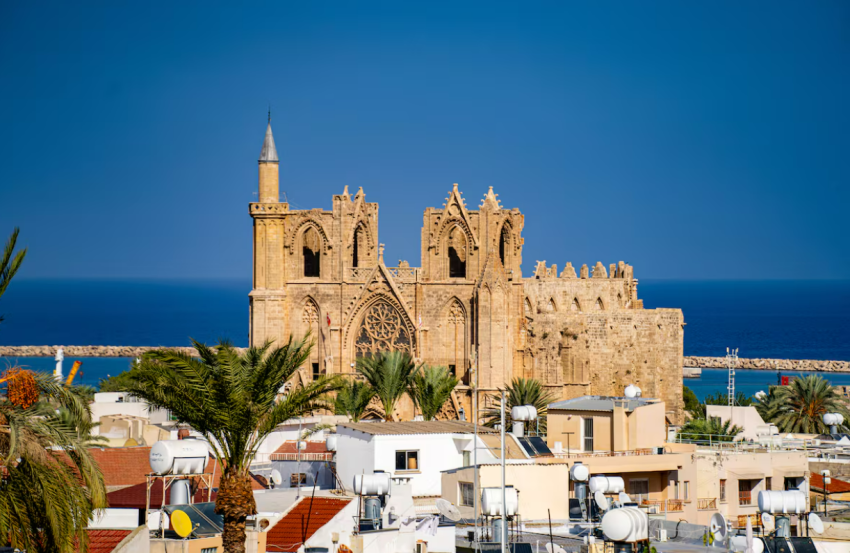Few Mediterranean islands hold as much contrast and mythology as Cyprus — the legendary birthplace of Aphrodite, the Greek goddess of love. Divided between two nations yet united by sunlight, sea, and stories, Cyprus offers an unforgettable journey from its southern beaches to its northern walled cities.
Where Aphrodite Was Born: The Southern Coast
Begin your adventure in Paphos, where myth meets reality. A short drive away lies Petra tou Romiou, better known as the Rock of Aphrodite. Waves crash dramatically against this rugged formation, said to be the very spot where the goddess rose from the foam. It’s easy to see why legends were born here — the turquoise sea and untouched pebble beach radiate a timeless beauty.
Continue eastward to Kouklia, an archaeological site where the ruins of an ancient temple dedicated to Aphrodite still stand. Scattered columns and stone walls are all that remain, yet they evoke a sacred past. Together, Kouklia and the Rock form part of the official Aphrodite Cultural Route, a trail that connects mythological landmarks across the island.
Larnaca: A Mix of Faith and Leisure
From myth to modernity, head to Larnaca, Cyprus’s third-largest city and home to the island’s busiest airport. Larnaca is a beach lover’s haven, with its palm-lined Finikoudes Promenade, vibrant cafés, and long stretches of soft sand. By day, sunseekers stroll along the boardwalk; by night, locals gather at open-air bars as the Mediterranean breeze carries the sound of laughter and music.
Yet beyond the seaside, Larnaca holds a deep spiritual past. Visit the Church of Saint Lazarus, a 9th-century Orthodox masterpiece said to house the remains of the saint resurrected by Christ. Step below into its crypt for a moment of quiet reflection amid flickering candlelight.
Just outside the city, the Hala Sultan Tekke Mosque stands beside the tranquil Salt Lake — a revered site for Muslims, built where Umm Haram, a relative of the Prophet Muhammad, is said to be buried. In winter, flamingos gather on the lake’s shimmering surface, painting a surreal pink reflection beneath the sky.
Crossing the Divide: The North Awaits
Cyprus’s divided heart is Nicosia, the world’s last split capital. Cross the Green Line — easily done on foot through the Ledra Street checkpoint — and you step into the Turkish Republic of Northern Cyprus. No visa stamps, no tension, just two sides of a fascinating story.
Continue north toward Famagusta, a historic coastal city once famed for its golden beaches and medieval charm. Before 1974, the seaside district of Varosha was a glamorous resort where celebrities like Elizabeth Taylor and Paul Newman came to escape. After the Turkish invasion, it was sealed off and abandoned — now eerily frozen in time. In recent years, parts of Varosha have reopened to visitors, allowing travelers to wander its ghostly streets and sunbathe on a reopened stretch of sand.
Famagusta: Where History Still Echoes
Beyond Varosha lies the walled city of Famagusta, one of the Mediterranean’s great historical treasures. Within its stone ramparts stands the Lala Mustafa Pasha Mosque, once the Gothic Cathedral of St. Nicholas. The soaring arches and stained glass were built by crusaders; today, a single minaret rises where a bell tower once stood — a perfect symbol of Cyprus’s layered history.
Nearby, the Othello Tower evokes Shakespearean legend, said to have inspired his tragic play. Stroll through Namik Kemal Square, where cafés buzz beneath ancient façades, and imagine the days when this city crowned kings of Cyprus and Jerusalem alike.
A short drive north takes you to the ancient ruins of Salamis, one of the most impressive archaeological sites on the island. Wander through its marble columns, amphitheater, and Roman baths, where echoes of the empire still linger in the salty air.
Taste and Rest
Finish your day in a shaded garden restaurant in Famagusta. Order a selection of meze — small Turkish-style dishes — followed by grilled kebab and a glass of ayran, a refreshing yogurt drink lightly salted and flavored with mint. As the evening light fades, the call to prayer mingles with the murmur of conversation, a reminder that Cyprus, though divided by politics, remains a shared island of history, faith, and Mediterranean soul.

